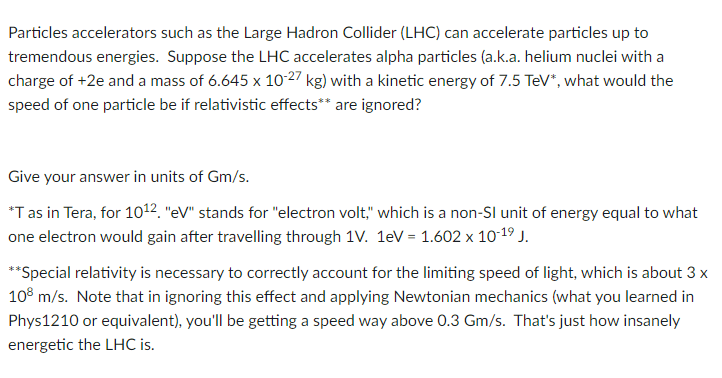Particles accelerators such as the Large Hadron Collider (LHC) can accelerate particles up to tremendous energies. Suppose the LHC accelerates alpha particles (a.k.a. helium nuclei with a charge of +2e and a mass of 6.645 x 1027 kg) with a kinetic energy of 7.5 TeV*, what would the speed of one particle be if relativistic effects** are ignored? Give your answer in units of Gm/s. *T as in Tera, for 1012. "eV" stands for "electron volt," which is a non-Sl unit of energy equal to what one electron would gain after travelling through 1V. 1eV = 1.602 x 1019 J. **Special relativity is necessary to correctly account for the limiting speed of light, which is about 3 x 10° m/s. Note that in ignoring this effect and applying Newtonian mechanics (what you learned in Phys1210 or equivalent), you'll be getting a speed way above 0.3 Gm/s. That's just how insanely energetic the LHC is.
Particles accelerators such as the Large Hadron Collider (LHC) can accelerate particles up to tremendous energies. Suppose the LHC accelerates alpha particles (a.k.a. helium nuclei with a charge of +2e and a mass of 6.645 x 1027 kg) with a kinetic energy of 7.5 TeV*, what would the speed of one particle be if relativistic effects** are ignored? Give your answer in units of Gm/s. *T as in Tera, for 1012. "eV" stands for "electron volt," which is a non-Sl unit of energy equal to what one electron would gain after travelling through 1V. 1eV = 1.602 x 1019 J. **Special relativity is necessary to correctly account for the limiting speed of light, which is about 3 x 10° m/s. Note that in ignoring this effect and applying Newtonian mechanics (what you learned in Phys1210 or equivalent), you'll be getting a speed way above 0.3 Gm/s. That's just how insanely energetic the LHC is.
Modern Physics
3rd Edition
ISBN:9781111794378
Author:Raymond A. Serway, Clement J. Moses, Curt A. Moyer
Publisher:Raymond A. Serway, Clement J. Moses, Curt A. Moyer
Chapter1: Relativity I
Section: Chapter Questions
Problem 34P: Two powerless rockets are on a collision course. The rockets are moving with speeds of 0.800c and...
Related questions
Question

Transcribed Image Text:Particles accelerators such as the Large Hadron Collider (LHC) can accelerate particles up to
tremendous energies. Suppose the LHC accelerates alpha particles (a.k.a. helium nuclei with a
charge of +2e and a mass of 6.645 x 10-27 kg) with a kinetic energy of 7.5 TeV*, what would the
speed of one particle be if relativistic effects** are ignored?
Give your answer in units of Gm/s.
*T as in Tera, for 1012. "eV" stands for "electron volt," which is a non-Sl unit of energy equal to what
one electron would gain after travelling through 1V. 1eV = 1.602 x 10-19 J.
**Special relativity is necessary to correctly account for the limiting speed of light, which is about 3 x
10° m/s. Note that in ignoring this effect and applying Newtonian mechanics (what you learned in
Phys1210 or equivalent), you'll be getting a speed way above 0.3 Gm/s. That's just how insanely
energetic the LHC is.
Expert Solution
This question has been solved!
Explore an expertly crafted, step-by-step solution for a thorough understanding of key concepts.
This is a popular solution!
Trending now
This is a popular solution!
Step by step
Solved in 2 steps

Recommended textbooks for you

Modern Physics
Physics
ISBN:
9781111794378
Author:
Raymond A. Serway, Clement J. Moses, Curt A. Moyer
Publisher:
Cengage Learning

University Physics Volume 3
Physics
ISBN:
9781938168185
Author:
William Moebs, Jeff Sanny
Publisher:
OpenStax

Physics for Scientists and Engineers: Foundations…
Physics
ISBN:
9781133939146
Author:
Katz, Debora M.
Publisher:
Cengage Learning

Modern Physics
Physics
ISBN:
9781111794378
Author:
Raymond A. Serway, Clement J. Moses, Curt A. Moyer
Publisher:
Cengage Learning

University Physics Volume 3
Physics
ISBN:
9781938168185
Author:
William Moebs, Jeff Sanny
Publisher:
OpenStax

Physics for Scientists and Engineers: Foundations…
Physics
ISBN:
9781133939146
Author:
Katz, Debora M.
Publisher:
Cengage Learning

College Physics
Physics
ISBN:
9781938168000
Author:
Paul Peter Urone, Roger Hinrichs
Publisher:
OpenStax College

Principles of Physics: A Calculus-Based Text
Physics
ISBN:
9781133104261
Author:
Raymond A. Serway, John W. Jewett
Publisher:
Cengage Learning

Physics for Scientists and Engineers
Physics
ISBN:
9781337553278
Author:
Raymond A. Serway, John W. Jewett
Publisher:
Cengage Learning